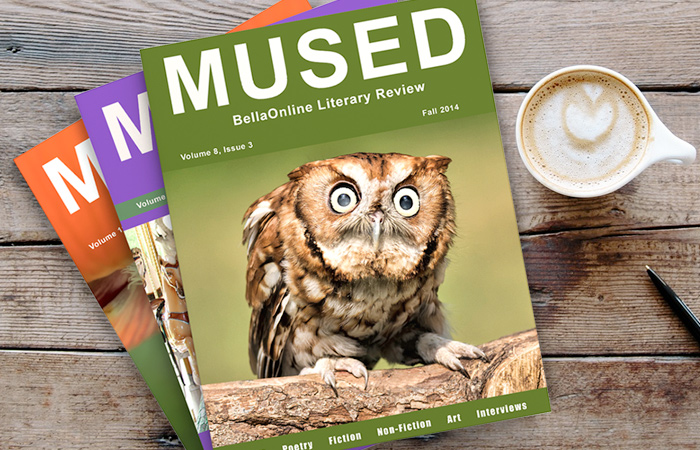-

-
Non-Fiction Submission Information
Non-Fiction Submission Guidelines
Adding Details to Your Story
Bringing Emotions to Your Story
Story Ideas and Brainstorming
Writing About an Interesting Person
Non-Fiction Submission Form
Main Submission Guidelines
General Mused Submission FAQs
Mused Contributor Bio and Photo
Calculating a Word Count
Proofreading Your Submission
Submission Guidelines for Non-Fiction
The term non-fiction means "True Life" - these stories are real. While the Fiction area holds fantasy stories which are made up, this Non-Fiction area holds real life tales about overcoming obstacles, achieving triumphs, and surviving another day.We would love to hear about the events you have gone through and the challenges that you faced. We are seeking stories which will provoke thoughts, inspire action, educate, and illuminate our readers. Here are some areas to focus on for your submissions to Mused. By paying attention to these areas, you have the best possible chance of being accepted and published.
Bring your Story to Life
Most of us had pets growing up. If your explanation is very generic then it's hard for us to see your unique vision. Avoid the generic, such as "I had a rabbit. I loved my rabbit. One day my rabbit died. I felt sad." While true, this explanation does not help us see YOUR particular story. We want to see what made your situation unique.
Tell us the details. "I was desolate because my beloved grandmother had just died. It seemed that I cried myself to sleep every night. One morning when I woke up there was a wire cage sitting next to my bed. In it was a gentle fawn-brown rabbit speckled with white dollops. Her eyes were large and dark brown, and she seemed to understand me completely. I leant over and named her Rose, after my grandmother, and it seemed as if suddenly life could be enjoyed again." We want to immerse in your world and be there with you.
Adding Details to Your Story
Invest in Emotions
A story connects with readers most powerfully when there are emotions intertwined with the telling. The day in the life of a horse-loving girl is sweet, but it can become dry if it's simply a recital of how she brushed the mane, cleaned the saddle, and mucked out the stall. Let us know how the characters are feeling. Let us feel what it would have been like to be in that situation.
Bringing Emotions to Your Story
Share a Full Story
When a reader invests their time to start reading, they want to be rewarded with an experience where they learn something new and are shown a world they didn't previously know about. Motivational posters are cute, but they are only a foundation for the full non-fiction story. We are looking for a robust, full journey. If the entry only has six lines and says "Fall is lovely. Leaves fall and land on the ground. The End." - that is not an immersive experience that our readers feel is worth opening a browser page to read. We want to see fall through your eyes! The experience of fall in Seattle, Washington is far different than the experience of fall in the mountains of Vermont. Share with us your particular vision, and let us enjoy the details that make your experience unique!
Story Ideas and Brainstorming
Insights into an Interesting Person
Sometimes a submitted essay is not about the author. Sometimes it is about another person. If you are choosing to write about Queen Elizabeth or Mother Theresa, or another inspiring, famous person, be sure to give us your own personal take on what makes this person special. Our readers have probably already read this person's bio in a news story or in a 10th grade class. Make your version one they would have an interest in reading. What new angle can you provide which makes the story relevant to their lives?
Writing About an Interesting Person
Educational Material
Another type of submission which is not a first-person-story is an essay which is intended to be educational. An example of this would be an essay which discusses the benefits of home schooling. The key here is that the article should still include a sense of the author's personal experiences. If the article is simply a dry statement of "Cats are nice. Cats should be fed daily. Cats should be vaccinated." - this type of information can be found on Wikipedia and many other article-based sites. Mused is intended for more personal essays which allow the voice of the author to shine through. In addition, make sure the essay is complete. A short four-paragraph blurb about "keep your children safe" would not be informative, and again would not be accepted for publication.
Family Friendly
It's critical that any submission for Mused be family friendly. Yes, we understand that intimate encounters between loving couples are a beautiful part of life. We understand violent interactions are a tragic reality. There are many venues for sharing that type of information, but Mused is not able to accept those entries. Please make sure there are no mentions of private body parts or intimate acts in the story you submit. We also cannot run profanities.
Properly Formatted
One of the most common reasons we have to reject a non-fiction entry is that it is not properly formatted, has numerous typos, and has grammar errors. We need the entry you submit to be ready to be published. Make sure there's a full blank line between every paragraph. Run a spell check, but do not rely on it to catch every type of error. It would not realize that "it's" should have been used instead of "its" - both are spelled properly, but each is used in different situations. Have friends and family proof your essay for you. Here are some common errors to avoid!
Proofreading Your Submission
The non-fiction area is not intended for poetry. Please submit all original poetry to the Poetry Editorial Team.
Entry Details
Submissions are limited to three entries for a given issue. Each submission cannot exceed 5,000 words in length.
Non-Fiction Submission Guidelines
Adding Details to Your Story
Bringing Emotions to Your Story
Story Ideas and Brainstorming
Writing About an Interesting Person
Calculating a Word Count
Proofreading Your Submission
Non-Fiction Submission Form
